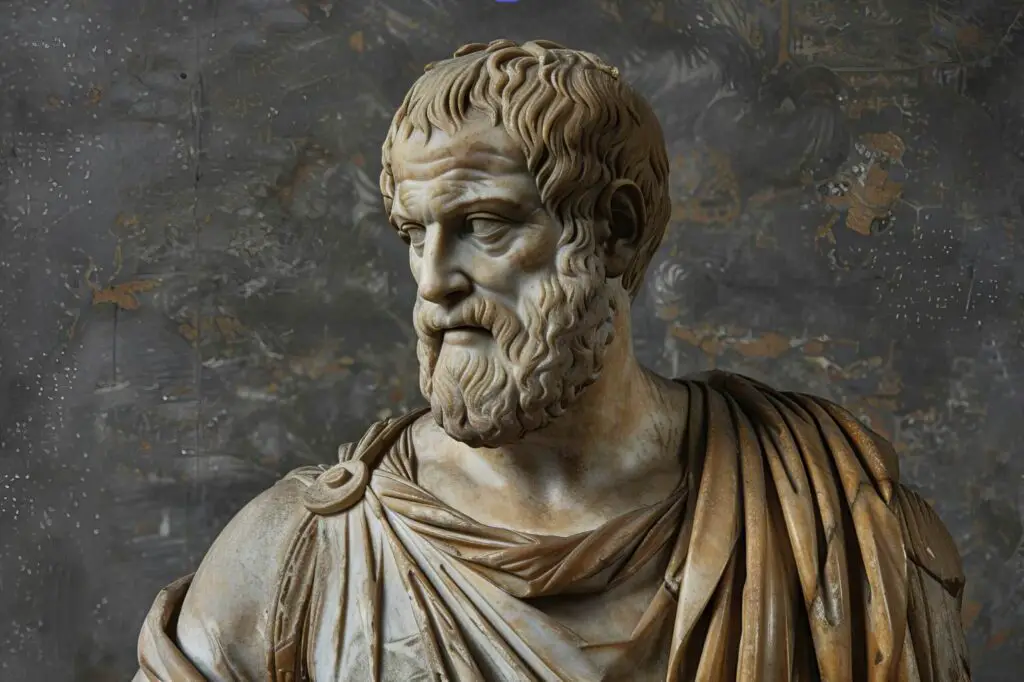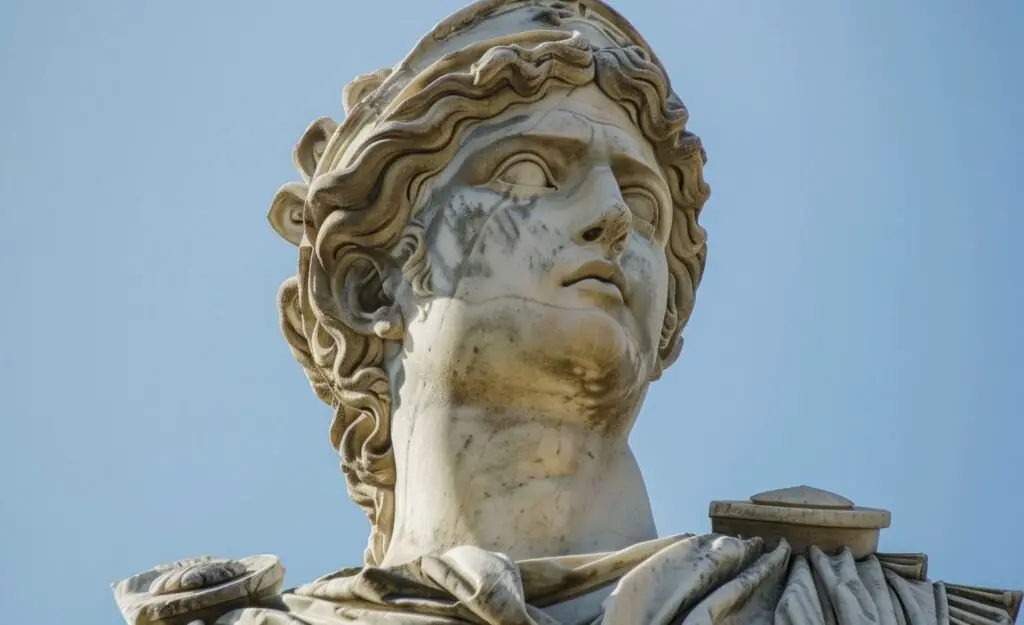When Aristotle, the eminent philosopher of antiquity, was entrusted with the education of the young Alexander, heir to the Macedonian throne, history was poised for a profound transformation. This intellectual engagement between one of history’s most revered minds and the future conqueror of empires spanned the realms of philosophy, science, politics, and ethics. Within this intersection of scholarship and leadership, we explore the magnitude of Aristotle’s influence on Alexander the Great.
The contours of this relationship reveal not only a private tutorship but also a broader philosophical underpinning that would echo through Alexander’s legendary exploits. As we unravel the fabric of this pedagogical bond, we delve into the nuances of ancient instruction and seek traces of the Aristotelian legacy in the roots of the empire.
Table of Contents
- The Tutoring of Alexander by Aristotle
- Philosophical and Ethical Instruction
- Aristotle’s Impact on Alexander’s Views on Governance
- Long-Term Influence of Aristotle on the Hellenistic Period
- Related Questions
The Tutoring of Alexander by Aristotle
The Intersection of Greatness: Aristotle’s Role as Alexander the Great’s Tutor
In the annals of history, it is not uncommon to find the tutelage of eminent scholars shaping the minds of future leaders. One such famed pairing is that of Aristotle, an intellectual giant of the Classical era, and his pupil, Alexander the Great, whose conquests have become legends. The circumstances that brought these two influential figures together constitute a narrative where politics, philosophy, and education converge in a formative moment for Western civilization.
Aristotle’s Journey to Mentorship
The entrustment of young Alexander’s education to Aristotle was the brainchild of King Philip II of Macedon, Alexander’s father. Recognizing the imperative of a robust education for his heir, Philip sought a tutor equipped with knowledge and the ability to impart wisdom. In Aristotle, he saw not just the academia’s luminary, grounded in the philosophical lineage of Plato and Socrates, but also a man vested in the practicalities of governance, ethics, and the natural world.
But how did Aristotle ascend to such a revered position? Well before he engaged with Alexander, Aristotle had established his credentials at Plato’s Academy in Athens, garnering respect for his intellectual prowess. Following Plato’s death, Aristotle, a native of the Macedonian region of Stagira, found favor with the Macedonian court. It was around 343 BCE, when Aristotle was in his late 30s, he was commissioned to teach the then 13-year-old prince Alexander.
The Scope of Aristotle’s Pedagogy
Aristotle’s teaching methods and content were comprehensive, crossing the boundaries of conventional education. The classroom was set in the sacred precinct of Nymphs at Mieza, where a tailored curriculum awaited the young prince. It encompassed various subjects – from ethics and politics, which would lay the foundations for Alexander’s future rule, to poetics, metaphysics, and the natural sciences. Aristotle, being a polymath, was uniquely positioned to guide his pupils through an extensive terrain of knowledge and thought.
Not merely content with rote learning or abstract thought, Aristotle imbued Alexander with a pragmatic approach. He was intent on cultivating the prince’s reasoning and critical thinking skills, equipping him with the tools to analyze and act upon various complex situations that he would encounter as a leader. This fusion of intellectual rigor and practical application distinguished Aristotle’s mentorship.
One notable aspect of their studies was Aristotle’s emphasis on philosophy and ethics. Works like Homer’s “Iliad” were not just literature but vehicles for imparting noble values and leadership qualities. Philosophy was the crux, the means through which Aristotle sought to instill in Alexander an understanding of virtue, governance, and what it meant to be a just ruler.
Moreover, Aristotle’s scientific observations engendered in Alexander an enduring fascination with the natural world, as evidenced by his meticulous attention to the flora and fauna he encountered during his subsequent military campaigns. It is said that Aristotle’s influence was such that Alexander carried his works on his expeditions, combining the roles of a conqueror with that of a patron of scholarship and science.
This broad scope of educational content under Aristotle’s guidance was not just to create a well-rounded knowledge base but to foster in Alexander the makings of a philosopher-king – a ruler steeped in wisdom, driven by inquiry, and bound by the tenets of ethical leadership.
The Legacy of Aristotle’s Tutorship
The fruits of Aristotle’s education were borne out in Alexander’s subsequent actions. His enlightened governance, the establishment of new cities, and the spread of Hellenistic culture across his empire were all colored by the philosophical underpinnings provided by his mentor. While Aristotle’s direct influence on specific strategic decisions of Alexander remains a subject of historical debate, one cannot deny the intellectual framework that Aristotle provided, which undoubtedly shaped Alexander’s perspective and actions.
The historical significance of their association is considerable, as it demonstrates the age-old conviction that outstanding leadership is, in part, an intellectual endeavor crafted from the rigorous pursuit of knowledge and the cultivation of wisdom. As we survey the ancient landscapes of such influential partnerships, we glean insights into the power of education to mold individuals who can leave indelible marks upon the tapestry of human history.
Far from a mere transactional relationship between teacher and student, the story of Aristotle and Alexander symbolizes the potential of thoughtfully guided education to inspire an extraordinary life trajectory, one that intertwines knowledge, virtue, and ambition in the pursuit of greatness.

Philosophical and Ethical Instruction
Aristotle’s Philosophical and Ethical Teachings to Alexander: Shaping the Mind of a Conqueror
When Aristotle, the great philosopher of antiquity, taught young Alexander the future “Great,” it was not merely a teacher-student relationship but one that would leave indelible marks on the canvas of history. While the breadth of Aristotle’s teachings might encompass many subjects—from biology to rhetoric—the true crux of his impartations lay in philosophy and ethics.
These principles would include Alexander’s intellect and approach to conquest and leadership, which infused his expansive campaigns with a unique blend of knowledge and moral consideration.
Aristotle’s Approach to Virtue and Governance
Foremost in Aristotle’s philosophical arsenal was virtue ethics, a view that good character is at the heart of well-lived life and ethical behavior. Aristotle proposed that a “virtuous” personality was the cornerstone of ethical action and governance, emphasizing balance—the “Golden Mean”—between extremes of any trait. This intricate understanding of virtue was not lost on Alexander, for whom Aristotle’s teaching would act as a compass throughout his unparalleled conquering odyssey.
In Alexander’s nascent mind, Aristotle sowed seeds of a governing philosophy that prized the harmonious integration of conquered peoples, a stark diversion from the era’s prevalent practices of merciless subjugation. Aristotle’s political musings on the role of a ruler were clear: to exercise power with a look towards the collective good and foster unity under a ‘polis’ knit closely by shared objectives and mutual respect.
The Impact on Military Campaigns and Empire Building
Alexander’s military campaigns, viewed through the lens of Aristotle’s ethical teachings, were not merely quests for territorial expansion but exemplified a unique fusion of force with philosophy. Aristotle’s influence is perceptible in Alexander’s attempts to merge Greek and Persian cultures, in his approach to lending autonomy to the localities under his domain, and even in his notion of spreading ‘Hellenization’—the implanting of Greek culture and thought across the known world.
As Alexander ventured beyond the edges of the Greek world, he carried the Aristotelian ideal of ‘eudaimonia’—human flourishing—as a guiding principle for himself and his newly established territories. His practices often mirrored the pursuit of a societal equilibrium where various cultures could coalesce under a larger Hellenistic ethos, fulfilling both the ruler’s and the subjects’ potential for a greater collective good.
Challenges to the Integration of Philosophy in Conquests
The practical application of Aristotle’s ethical groundwork in the context of Alexander’s conquests was not without its contentions. Emulating philosophical principles in the raw theatre of war indeed posed complex challenges. Alexander thrust into the unforgiving realm of combat and domination, often faced the dichotomy of upholding these lofty ideals while not succumbing to the classic pitfalls of power and imperialism.
Implementing a balanced, ethical framework within the unpredictable and often ruthless environment of ancient conquering campaigns necessitated a nuanced navigation between idealism and pragmatism. Alexander’s attempts at integrating cities into his empire, fostering diverse cultural exchanges, and occasionally adopting a merciful stance were testament to the lingering presence of Aristotle’s philosophical imprints on his psyche—even as the necessities of war occasionally dictated otherwise.
The Synthesis of Knowledge, Virtue, and Ambition
Finally, Alexander’s story under Aristotle’s mentorship serves as a monumental instance of the synthesis of knowledge, virtue, and ambition, encapsulating the transformative power of education and the enduring influence of ethical philosophy on leadership. The confluence of Aristotle’s teachings with Alexander’s ambitions created a leader who was not merely a conqueror but a proponent of a vision that sought to unify disparate worlds through a shared, albeit dominantly, Greek, cultural, and intellectual framework.
Aristotle’s imprint on Alexander’s life and reign reflects the profound potential that philosophical and ethical instruction holds in guiding the actions and decisions of individuals at the crossroads of history. As much as the sword carves territories, the intangible might of philosophical thought and ethical consideration imbues empire-building with a lasting legacy, transcending the confines of the epoch in which they were conceived.

Aristotle’s Impact on Alexander’s Views on Governance
The Impact of Aristotle’s Philosophical Teachings on Alexander the Great’s Leadership and Governance
Aristotle’s tutelage of Alexander the Great remains a cornerstone in the annals of history, illustrating the profound impact a mentor’s philosophical knowledge can have on molding a ruler’s mind. Known for his intellectual prowess, Aristotle instilled in Alexander not just knowledge but a framework for viewing the world and its governance. The trajectory of Alexander’s conquests and his approach to leadership were significantly shaped by Aristotelian philosophy, reflecting a deep intertwining of thought and action that transcended the boundaries of the classroom.
Aristotle, the renowned philosopher of ethics, politics, and science, was charged with educating a young prince who would soon command the world stage. Though inherently his own, Alexander’s vision of leadership and governance was undoubtedly influenced by Aristotle’s enduring principles, especially regarding the moral and practical aspects of rulership. This influence articulated a blueprint for statecraft that espoused rationality, ethical behavior, and a keen interest in amalgamating cultures under a single, expansive empire.
Central to Aristotle’s teachings was the idea of the “virtuous leader,” a concept that advocates for moral excellence as the highest good. This principle asserts that a ruler’s character should epitomize the virtues of courage, temperance, and wisdom, among others. Riding on the coattails of this ideology, Alexander sought not merely to conquer but to be a paragon of virtue in his dominion. This was evident in his treatment of conquered peoples, where, rather than imposing draconian measures, he sought to educate and integrate them into the Hellenic fold, demonstrating a respect for diversity and a desire for unity through shared culture and knowledge.
In the political arena, Aristotle’s insights into the dynamics of governance and statecraft offered Alexander a nuanced understanding of power and its responsibilities. The polis, or city-state, was a central element of Aristotle’s political theory, serving as the nucleus of culture, politics, and military might. Alexander’s establishment of cities across his vast empire can be viewed as a direct manifestation of his mentor’s ideas, creating centers of learning, governance, and cultural exchange that shaped the social and political landscapes of the time.
Moreover, Aristotle’s belief in the balance of governance forms, particularly between monarchy, aristocracy, and democracy, influenced Alexander’s approach to ruling his expansive empire. While absolute power was central to Alexander’s rule, the concept of balance taught by Aristotle may have inspired him to employ elements of shared governance, as seen in his inclination to involve local elites and create hybrid political structures.
Another Aristotelian tenet, the “Golden Mean,” underscored the importance of maintaining equilibrium among various traits to achieve virtue. Alexander’s attempts to strike a balance between the extremes of cruelty and leniency, between Greek superiority and acceptance of Persian customs, echo the pursuit of this harmonious mean, underscoring the nuanced complexity of leadership and the delicate act of fostering unity within a diverse empire.
Aristotle’s influence on Alexander was not limited to the philosophical domain but extended into the practical realm of military strategy and empire-building. The fusion of force and philosophy, where the military might be complemented by a quest for cultural integration and enlightenment, reflected a distinctive approach grounded in Aristotelian thought.
In conclusion, the imprints of Aristotle’s teachings on Alexander the Great’s paradigm of leadership and governance are pervasive and indelible. Alexander’s expansive empire, characterized by a blend of military prowess and philosophical enlightenment, served as a testament to the transformative power of education and the visionary application of ethical and political philosophy.
Though centuries have passed, the relationship between Aristotle and Alexander is a monumental example of how the adoption of philosophical principles can profoundly influence leadership and leave an enduring mark on history.

Long-Term Influence of Aristotle on the Hellenistic Period
The Enduring Consequences of Aristotle’s Tutorship of Alexander on the Hellenistic Philosophical Landscape
The relationship between Aristotle and Alexander the Great, a junction of towering intellect and unbridled power, set forth a torrent of change that swept through the Hellenistic world, leaving an indelible mark on its philosophical terrain.
The grooming of Alexander under Aristotle not only shaped an empire but also seeded the soil from which an evolved philosophical discourse could flourish. Shaped by rigorous study and critical thought, Alexander’s conquests often reflected a philosophical underpinning, undoubtedly influenced by his mentor Aristotle, weaving together a warcraft with a vision of a cultural and philosophical empire.
At the heart of this philosophical dissemination lay the idea of Hellenization, which can be credited with binding disparate cultures under a common thread. Aristotle’s tenets of logic, science, and ethics were instrumental in forging the universality of Hellenistic culture, encouraging a synthesis of ideas and knowledge across Alexander’s dominions.
As cities were built, often named Alexandria in the act of branding and flattery, they stood as beacons of Hellenistic philosophy, mirroring the classical Greek polis. These cities became the hubs from which Aristotelian thoughts permeated local traditions, engendering a new cultural psyche oriented towards reason and observation.
The philosophical consequences of Aristotle’s guidance were particularly palpable in science and knowledge. The establishment of the Library of Alexandria under the Ptolemaic dynasty, Alexander’s successors, encapsulated the zenith of knowledge curation and intellectual fervor that served as the epicenter of scientific and philosophical inquiry. This was in keeping with Aristotle’s lifelong passion for collecting and categorizing knowledge—a legacy that Alexander’s conquests helped globalize.
Moreover, the spread of Hellenistic culture during and after Alexander’s rule led to the rise of new philosophical schools, each touching upon the complex interplay of ethics, metaphysics, and human purpose. There was a surge of interest in personal ethics and philosophical ways to address human suffering, leading to the establishment of Stoicism by Zeno of Citium, Epicureanism by Epicurus, and Cynicism, all of which offered differing views on how to live a good life—a question fundamentally anchored in Aristotelian ethics. These schools argued over concepts like virtue, happiness, and the nature of the divine, drawing from and sometimes reacting against Aristotelian doctrines. Their existence and growth underscore the pervasive influence of Aristotle’s teachings.
While Alexander’s empire fragmented swiftly after his death, the philosophical imprint created through his Hellenization efforts evolved into a legacy that outlasted his temporal domains. Spurred by the fusion of Aristotelian teachings with varied cultural and intellectual traditions, Hellenistic philosophy incubated a rich cross-pollination of ideas that reverberated through the ages. This Hellenistic synthesis underscored the dynamic nature of philosophical thought as both receptive and adaptive to the striking mosaic of human experience.
In retrospect, the enduring consequences of Aristotle’s teaching were not merely in the guidance of one of history’s most celebrated rulers but in setting the stage for a philosophical dialogue defining an era. The mosaic nature of this philosophical expansion during the Hellenistic period stands as a testament to the enduring power of education and dialogue across cultures, emphasizing Aristotle’s integral role in shaping the intellectual narratives beyond the life of his most famous pupil.

The enduring whispers of Aristotle’s voice resonated long after Alexander’s epic saga had unfolded across the Hellenistic world. The principles of knowledge and governance he imparted to his royal pupil transcended the battlefield, shaping political structures and cultural ideologies in the expansive realm Alexander forged.
This exploration of their intertwined legacies has traversed the intimate corridors of their teacher-student relationship and emerged into the grand theater of Hellenistic civilization. Aristotle’s philosophical imprint, mingled with Alexander’s conquests, stands as a testament to the power of education and thought in forging the bedrock of societies, resonating through the annals of history until the present day.
At A Bus On A Dusty Road, we talk about travel, life, and ex-pat living. We are all about “Living Life As A Global Citizen.” We explore social, cultural, and economic issues and travel.
We would love to have you be part of our community. Sign up for our newsletter to keep up-to-date by clicking here. If you have any questions, you can contact me, Anita, by clicking here.
Listen to our Podcast called Dusty Roads. You can find it on all major podcast platforms. Try out listening to one of our podcasts by clicking here.
Subscribe to our A Bus On A Dusty Road YouTube Channel with great videos and information by clicking here.
Related Questions
What Are The Differences Between Shanghai And Beijing, China?
Shanghai and Beijing are two important cities in China. Beijing is the capital of China; Beijing rules all of China. Shanghai is also an important city in China as it is a financial and business hub. It is also the most populated city in China. Though both cities are located in China, they have some unique differences.
By clicking here, you can discover What Are The Differences Between Shanghai And Beijing, China?
How Similar Are The Chinese And Vietnamese Languages?
Both Vietnamese and Chinese are Asian languages though they come from different language families. Vietnamese and Chinese are both tonal languages and have similar sentence structures. They are monosyllabic languages, meaning that one word has one syllable and several dialects are spoken.
By clicking here, you can discover How Similar Are The Chinese And Vietnamese Languages?.
10 Reasons You Can Live In Hong Kong And Only Speak English
You can live in Hong Kong and speak only English. Many Hong Kong people speak English. Hong Kong is a former British Colony, so English is one of the official languages. In Hong Kong, the police, courts, restaurants, banks, and shops, people will usually speak English; many schools are English-speaking.
By clicking here, you can discover 10 Reasons You Can Live In Hong Kong And Only Speak English.

